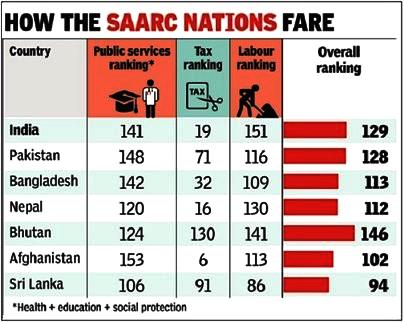Commitment to Reducing Inequality Index 2020: Oxfam | 24 Mar 2021
Why in News
Recently, the Labour and Employment Minister has informed the Lok Sabha that Oxfam Commitment to Reducing Inequality (CRI) Index 2020 lacked clarity and did not take into account provisions of the four new labour codes.
Key Points
- About:
- The Index ranked countries measuring their policies and actions in three areas that it said are proven to be directly related to reducing inequality:
- Public services (health, education and social protection)
- Taxation
- Workers’ rights
- Nigeria, Bahrain and India, which experienced the world’s fastest-growing outbreak of Covid-19, were among the world’s worst-performing countries in tackling inequality going into the pandemic.
- The Index ranked countries measuring their policies and actions in three areas that it said are proven to be directly related to reducing inequality:
- India's Position on the Index:
- Overall, India ranked 129 in the CRI index out of 158 countries on government policies, and actions in areas of public services of education, health, social protection, taxation, and workers’ rights.
- India slipped from rank 141 in the year 2018 to 151 in the year 2020 with weak labour rights and high incidence of vulnerable employment.
- Highest presence of the informal sector for men was in Uttar Pradesh at 86.9% and for women was in Andhra Pradesh at 73.6%.
- In terms of its public services, it ranked 141.
- India has been ranked 19 on the taxation pillar.
- Reasons for India’s Poor Performance:
- Exploiting Labours in Covid:
- Several state governments in India have used Covid-19 as a pretext to increase daily working hours from 8 to 12 hours a day and suspend minimum pay legislation, devastating the livelihoods of millions of poor workers now battling hunger.
- Low Health Budget:
- India’s health budget was the fourth lowest with half of its population having access to most essential health services, and more than 70% of health spending being met by people themselves.
- Informal Jobs:
- Most workers earn less than half of the minimum wage, 71% don’t have any written job contract while 54% do not get paid leave.
- Only around 10% of the workforce in India is formal.
- Exploiting Labours in Covid:
- Recommendation:
- In response to the coronavirus pandemic, governments must dramatically improve their efforts on progressive spending, taxation and workers’ pay and protection as part of National Inequality Reduction Plans under Sustainable Development Goal (SDG) 10.
- SDG 10:
- It calls for reducing inequalities in income as well as those based on age, sex, disability, race, ethnicity, origin, religion or economic or other status within a country.
- It also addresses inequalities among countries, including those related to representation, migration and development assistance.
- SDG 10:
- In response to the coronavirus pandemic, governments must dramatically improve their efforts on progressive spending, taxation and workers’ pay and protection as part of National Inequality Reduction Plans under Sustainable Development Goal (SDG) 10.
- Some Recent Indian Initiatives to Reduce Inequality:
- Increased allocation for health in Budget 2021-22 by 137%.
- Direct Tax Vivad se Vishwas Act, 2020 to provide for resolution of pending tax disputes.
- Transparent Taxation - Honoring The Honest’ platform to honour the honest taxpayers of the country.
- Introduced Industrial Relations Code, 2020, Code on Social Security, 2020 and the Occupational Safety, Health and Working Conditions Code, 2020.
- E-PG Pathshala: An initiative of the Ministry of Education to provide e-content for studies.
- SWAYAM: it provides for an integrated platform for online courses.
- National Education Policy (NEP), 2020.
Oxfam International
- About:
- Oxfam International is a group of independent non-governmental organisations formed in 1995.
- The name “Oxfam” comes from the Oxford Committee for Famine Relief, founded in Britain in 1942.
- The group campaigned for food supplies to starving women and children in enemy-occupied Greece during the Second World War.
- It aims to maximize efficiency and achieve greater impact to reduce global poverty and injustice.
- The Oxfam International Secretariat is based in Nairobi, Kenya.
- Other Reports:
- The Global Inequality Crisis Report by Oxfam in January 2021 claimed that India’s richest 1% hold more than four-times the wealth held by the bottom 70% of the country’s population.
- The Inequality Virus Report in January 2021 also found that the Covid pandemic deeply increased the existing inequalities in India and around the world.

